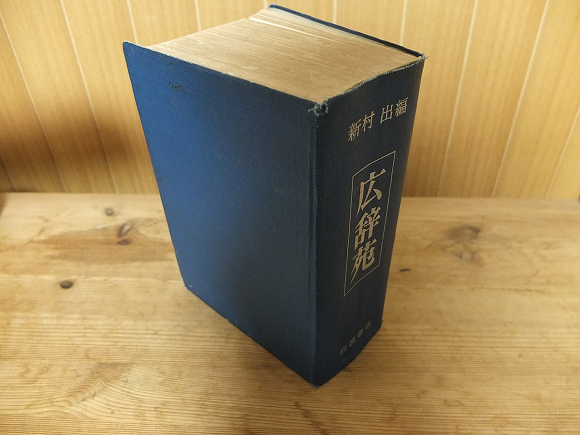
Critics call for revision to brand-new edition of one of Japan’s most trusted and influential language resources.
Following the release of its first edition in 1955, publisher Iwanami Shoten’s Kojien has become one of the most respected and widely used dictionaries in Japan. Since 1998, the tome has been on a 10-year update cycle, and so last week’s release of Kojien’s seventh edition was a big deal not just for linguists, but for Japanese society in general.
However, not more than a few days after it went on sale on January 12, criticisms have arisen regarding one of the new book’s definitions. Among the terms added to the seventh edition is “LGBT,” and not an equivalent using indigenous Japanese linguistic components. The four-letter acronym appears in the book as “LGBT,” just like it would in an English dictionary.
The inclusion of the term hasn’t caused any controversy, but what has is the way Kojien defines the term, which is:
“People with a different sexual orientation from the majority.”
Critics say that this definition improperly limits the scope of what the term stands for. Breaking the acronym into its components, “lesbian,” “gay,” and “bisexual” indicate sexual orientation, but “transgender,” represented by the last letter of the acronym, does not, instead referring to an individual’s gender identity.
Given the exalted position that Kojien occupies in academic and professional circles, the dictionary’s definitions have the potential to affect how educators, students, and businesspeople use and interpret words. Kanazawa University associate humanities professor Takeyoshi Iwamoto expressed his concerns about the book’s incomplete definition for LGBT, saying that he hopes the publisher will craft a more suitable entry for the term after consultation with experts and specialists. LGBT activist Mameta Endo had similar sentiments, saying that he would be alarmed if the limited definition in the new Kojien were to gain traction. “I want the publishers to revise the definition at the first opportunity,” he has said.
Iwanami Shoten, meanwhile, has issued a statement saying that it is aware of the concerns about the present definition, and is currently in internal discussions about whether to revise the definition, and if so, how to implement the change.
Source: Mainichi Shimbun, Asahi Shimbun via Hachima Kiko
Top image: Wikipedia/Precise tortoise

 Japanese government proposes raising age of consent from its current 13 years old
Japanese government proposes raising age of consent from its current 13 years old Web search reveals dark (and kinky) habits of beloved mythical Japanese spirit
Web search reveals dark (and kinky) habits of beloved mythical Japanese spirit Women in Japan to be allowed to buy morning-after pill without a doctor’s prescription
Women in Japan to be allowed to buy morning-after pill without a doctor’s prescription Japan to begin process of distributing vaccine passports, Chief Cabinet Secretary says
Japan to begin process of distributing vaccine passports, Chief Cabinet Secretary says Japanese public school to allow male students to wear skirts, chest ribbons as part of uniform
Japanese public school to allow male students to wear skirts, chest ribbons as part of uniform McDonald’s new Happy Meals offer up cute and practical Sanrio lifestyle goods
McDonald’s new Happy Meals offer up cute and practical Sanrio lifestyle goods More foreign tourists than ever before in history visited Japan last month
More foreign tourists than ever before in history visited Japan last month All-you-can-drink Starbucks and amazing views part of Tokyo’s new 170 meter-high sky lounge
All-you-can-drink Starbucks and amazing views part of Tokyo’s new 170 meter-high sky lounge Arrest proves a common Japanese saying about apologies and police
Arrest proves a common Japanese saying about apologies and police Starbucks reopens at Shibuya Scramble Crossing with new look and design concept
Starbucks reopens at Shibuya Scramble Crossing with new look and design concept Beautiful Sailor Moon manhole cover coasters being given out for free by Tokyo tourist center
Beautiful Sailor Moon manhole cover coasters being given out for free by Tokyo tourist center The oldest tunnel in Japan is believed to be haunted, and strange things happen when we go there
The oldest tunnel in Japan is believed to be haunted, and strange things happen when we go there Our reporter takes her 71-year-old mother to a visual kei concert for the first time
Our reporter takes her 71-year-old mother to a visual kei concert for the first time Is the new Shinkansen Train Desk ticket worth it?
Is the new Shinkansen Train Desk ticket worth it? We get our paws on all 50 Hello Kitty Happy Meal toys at McDonald’s Japan!
We get our paws on all 50 Hello Kitty Happy Meal toys at McDonald’s Japan! Disney princesses get official manga makeovers for Manga Princess Cafe opening in Tokyo
Disney princesses get official manga makeovers for Manga Princess Cafe opening in Tokyo We try out “Chan Ramen”, an underground type of ramen popular in the ramen community
We try out “Chan Ramen”, an underground type of ramen popular in the ramen community Beautiful new Final Fantasy T-shirt collection on the way from Uniqlo【Photos】
Beautiful new Final Fantasy T-shirt collection on the way from Uniqlo【Photos】 Foreign English teachers in Japan pick their favorite Japanese-language phrases【Survey】
Foreign English teachers in Japan pick their favorite Japanese-language phrases【Survey】 There’s a park inside Japan where you can also see Japan inside the park
There’s a park inside Japan where you can also see Japan inside the park Japanese convenience store packs a whole bento into an onigiri rice ball
Japanese convenience store packs a whole bento into an onigiri rice ball Studio Ghibli releases Kiki’s Delivery Service chocolate cake pouches in Japan
Studio Ghibli releases Kiki’s Delivery Service chocolate cake pouches in Japan Japan’s bone-breaking and record-breaking roller coaster is permanently shutting down
Japan’s bone-breaking and record-breaking roller coaster is permanently shutting down New definition of “Japanese whiskey” goes into effect to prevent fakes from fooling overseas buyers
New definition of “Japanese whiskey” goes into effect to prevent fakes from fooling overseas buyers Foreign passenger shoves conductor on one of the last full runs for Japan’s Thunderbird train
Foreign passenger shoves conductor on one of the last full runs for Japan’s Thunderbird train Our Japanese reporter visits Costco in the U.S., finds super American and very Japanese things
Our Japanese reporter visits Costco in the U.S., finds super American and very Japanese things Kyoto bans tourists from geisha alleys in Gion, with fines for those who don’t follow rules
Kyoto bans tourists from geisha alleys in Gion, with fines for those who don’t follow rules Studio Ghibli unveils Mother’s Day gift set that captures the love in My Neighbour Totoro
Studio Ghibli unveils Mother’s Day gift set that captures the love in My Neighbour Totoro Domino’s Japan now sells…pizza ears?
Domino’s Japan now sells…pizza ears? New Japanese KitKat flavour stars Sanrio characters, including Hello Kitty
New Japanese KitKat flavour stars Sanrio characters, including Hello Kitty Sales of Japan’s most convenient train ticket/shopping payment cards suspended indefinitely
Sales of Japan’s most convenient train ticket/shopping payment cards suspended indefinitely Sold-out Studio Ghibli desktop humidifiers are back so Totoro can help you through the dry season
Sold-out Studio Ghibli desktop humidifiers are back so Totoro can help you through the dry season Japanese government to make first change to romanization spelling rules since the 1950s
Japanese government to make first change to romanization spelling rules since the 1950s Ghibli founders Toshio Suzuki and Hayao Miyazaki contribute to Japanese whisky Totoro label design
Ghibli founders Toshio Suzuki and Hayao Miyazaki contribute to Japanese whisky Totoro label design Doraemon found buried at sea as scene from 1993 anime becomes real life【Photos】
Doraemon found buried at sea as scene from 1993 anime becomes real life【Photos】 Tokyo’s most famous Starbucks is closed
Tokyo’s most famous Starbucks is closed One Piece characters’ nationalities revealed, but fans have mixed opinions
One Piece characters’ nationalities revealed, but fans have mixed opinions We asked a Uniqlo employee what four things we should buy and their suggestions didn’t disappoint
We asked a Uniqlo employee what four things we should buy and their suggestions didn’t disappoint Princesses, fruits, and blacksmiths: Study reveals the 30 most unusual family names in Japan
Princesses, fruits, and blacksmiths: Study reveals the 30 most unusual family names in Japan Studio Ghibli’s new desktop Howl’s Moving Castle will take your stationery on an adventure
Studio Ghibli’s new desktop Howl’s Moving Castle will take your stationery on an adventure 16-year-old Japanese girls will no longer be allowed to marry, age of legal adulthood moves to 18
16-year-old Japanese girls will no longer be allowed to marry, age of legal adulthood moves to 18 Japanese parliament descends into utter chaos, shouting match over proposed water law【Video】
Japanese parliament descends into utter chaos, shouting match over proposed water law【Video】 Tokyo Olympics organizers offer to pay volunteers 125 yen 【US$1.13】 an hour, critics unimpressed
Tokyo Olympics organizers offer to pay volunteers 125 yen 【US$1.13】 an hour, critics unimpressed Is Asia missing the point of the ice bucket challenge? Taiwanese sufferer of ALS voices criticisms
Is Asia missing the point of the ice bucket challenge? Taiwanese sufferer of ALS voices criticisms How to get free healthcare in Japan without insurance
How to get free healthcare in Japan without insurance It seems like everyone in Japan wants this pillow featuring a famous sumo wrestler’s butt
It seems like everyone in Japan wants this pillow featuring a famous sumo wrestler’s butt Australian politician calls for immediate review of all anime due to depictions of “child abuse”
Australian politician calls for immediate review of all anime due to depictions of “child abuse” Commercial reveals what some LGBT individuals go through in Japan
Commercial reveals what some LGBT individuals go through in Japan Captured Tokyo panty thief denies having any interest in bras
Captured Tokyo panty thief denies having any interest in bras Same-sex prostitution business technically legal in Japan, goes untouched by police
Same-sex prostitution business technically legal in Japan, goes untouched by police Japanese government says Internet slang is too hard to understand, issues guidelines for netspeak
Japanese government says Internet slang is too hard to understand, issues guidelines for netspeak Tokyo women’s university will accept transgender students who identify as female, a Japan first
Tokyo women’s university will accept transgender students who identify as female, a Japan first “Conbini warp” an increasing traffic problem for businesses and authorities across Japan
“Conbini warp” an increasing traffic problem for businesses and authorities across Japan
Leave a Reply